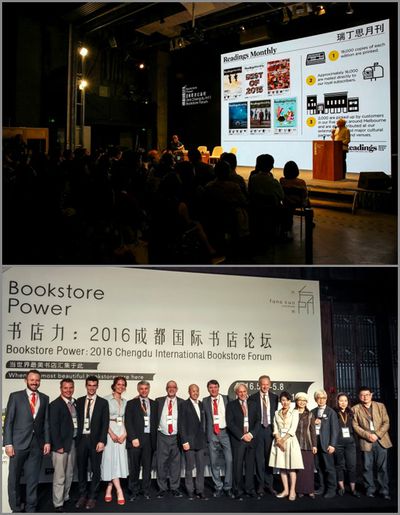I’ve just been to a book nerd’s paradise, a bookshop called Fang Suo Commune in Chengdu in Sichuan Province, China. Founded by Mao Jihong, owner of high-end fashion label Exception de Mixmind (China’s first lady is dressed by Mr Mao), Fang Suo is a giant space of 3800 square metres in the basement of an up-market shopping centre. It is a spectacularly beautiful and dramatic space with over 70,000 volumes, mostly in Chinese. I’d been invited to address the Chengdu International Bookstore Forum, along with eight foreign guests who included the CEO of the Australian Booksellers Association, Joel Becker; James Daunt, the MD of Waterstones in the UK; and Peter Goff, who has two English language Bookworm bookshops in China.
For three days we talked about bookshops in the modern economy in front of hundreds of people in the bowels of Mr Mao’s shop. The common question was: how does the physical bookshop remain relevant in a digital age? It was interesting to see how common the solutions were. If bookshops are to survive they need to be places that people feel a connection to and want to spend time in. They need to be what the American sociologist Ray Oldenburg described as the ‘third place’; they must be ‘anchors’ of community life that facilitate and foster broader, more creative interaction.
For Mr Mao it was the aesthetics of the bookshop that seemed to excite him most. With a growing educated middle class, the number and style of bookshops in China is changing, although there’s heavy censorship. The Taiwanese manager of Fang Suo told me that her customers often asked her for books that that were either banned or on subjects that couldn’t be written about, particularly the ‘three T’s’: Tibet, the Tiananmen Square Massacre, and Taiwan. In one session a Chinese bookseller, frustrated with Mr Mao’s emphasis on the beautiful space, said that bookshops should also be spaces where ideas flourished. It was a fascinating exchange.

Peter Goff’s Bookworm is famous for its literary festivals and it was during one festival that he was invited in for questioning by the police. This went on for five days and he was never quite sure what he’d done.
James Daunt owns a small group of independent bookshops in London, Daunt Books, and in 2011 he was asked to run Waterstones by its new owner, Russian billionaire Alexander Mamut. I asked Daunt why he’d taken on the job and he said that, while as an independent bookseller, he hated the idea of chains, Waterstones were on the verge of collapse and that if they had collapsed it would have been disastrous for the British book trade. Most of the independent British booksellers had closed under the onslaught of Amazon, who had grabbed over 40% of the market, and if Waterstones had closed there would only have been Amazon and the supermarkets left selling books. ‘Helping Waterstones survive seemed the lesser of two evils,’ he said. He started by making the shops more like independent bookshops (local staff deciding what titles to champion, encouraging individuality) and slowly it’s turned around with Waterstones returning to profitability last year.
My Chinese trip was an amazing three days immersed in a book business that was at once familiar yet slightly different.


